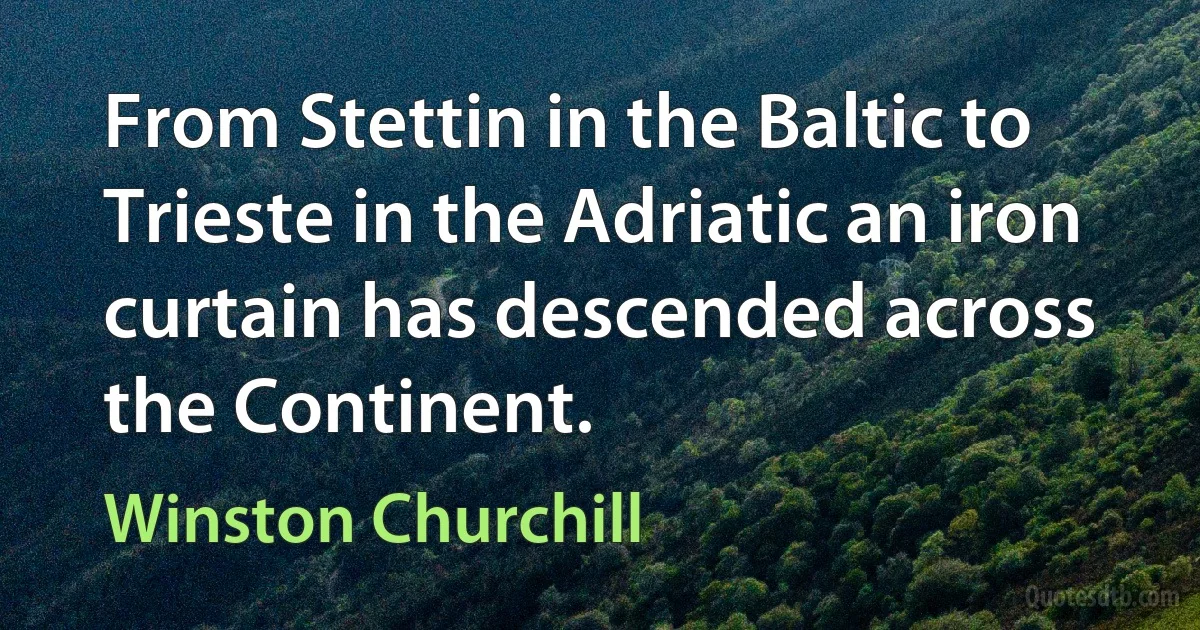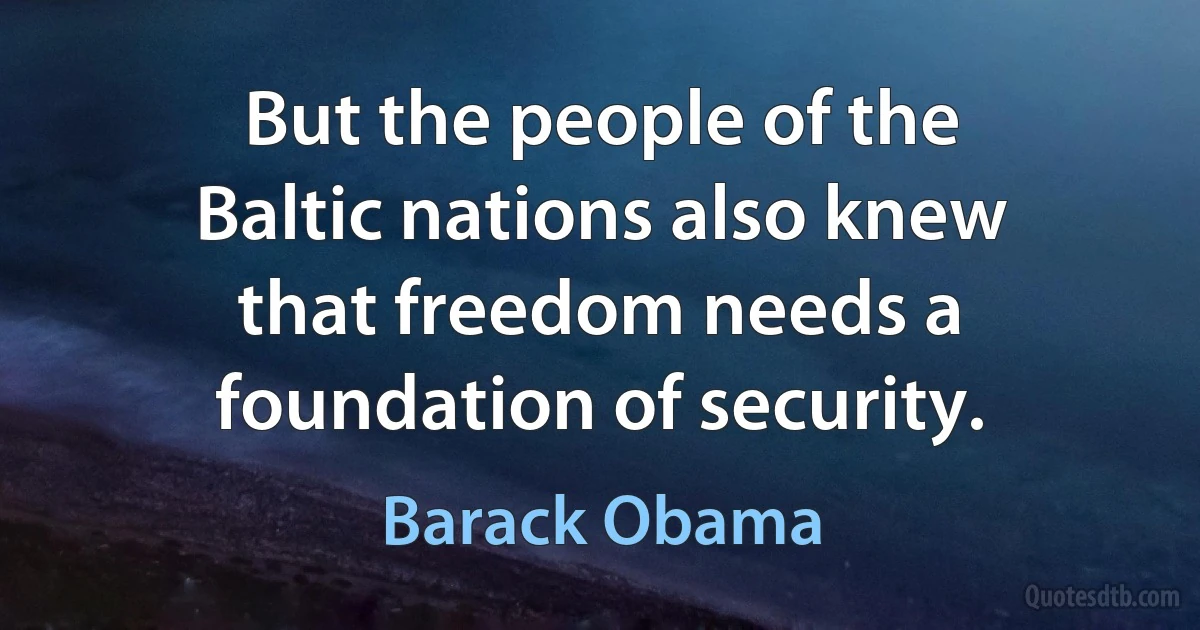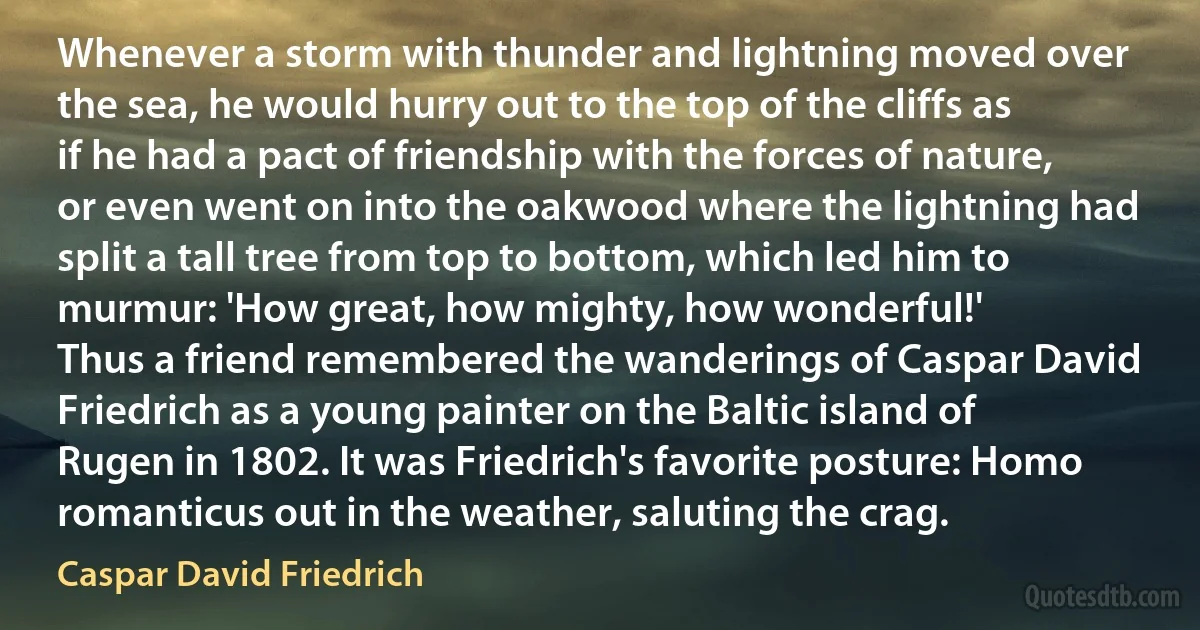Baltic Quotes
While thinking when sober, our success at reaching our goals by using the First Baltic Front troops, the Memel operation, it can't be disregarded, that they [the troops] not only honorably accomplished their powerful strategic operation, but also an infusion of victory for the Soviet armed forces and an entrance into the final stages of the war.

Hovhannes Bagramyan
This Spring of 1911 Marianne von Werefkin [his former study-mate in Russia and in fact his life-comapnion for many years, but never married] Andrei, Helene and I went to Prerow on the Baltic [coast]. For me that summer meant a great step forward in my art. I painted my finest landscapes there as well as large figure paintings in powerful, glowing colours and not at all naturalistic or objective. I used a great deal of red, blue, orange, cadmium yellow and chromium-oxide green. My forms were very strongly contoured in Prussian blue, and came with tremendous power from an inner ecstasy. 'Der Buckel', 'Violetter Turban', 'Selbstporträt'.. ..were created in this way. It was a turning-point in my art. It was in these years, up to 1914, just before the war [World War 1.], that I painted my most powerful works, referred to as the pré-war works.

Alexej von Jawlensky
No sooner was the Baltic open to our merchants, than corn was bought up there for importation into England; at the same time the continent was glutted with English goods, which, because the supply greatly exceeded the demand, were sold at less than their prime cost, and upon which the foreign governments soon laid new duties...to prevent the ruin of their own manufactures. This might have been a salutary lesson, if nations were ever rendered wise by experience; it might have taught us that, however willing one part of this nation might be to see the other ruined by the free admission of foreign grain, foreign governments would never consent to have their fabrics destroyed by the unrestricted introduction of British goods. It is a sound maxim in politics, whatever it may be in morals, that charity begins at home.

Robert Southey
Those attacks upon language and religion in Poland, the Baltic provinces, Alsace, Bohemia, upon the Jews in Russia, in every place that such acts of violence occur-in what name have they been, and are they, perpetrated? In none other than the name of that patriotism which you defend.
Ask our savage Russifiers of Poland and the Baltic provinces, ask the persecutors of the Jews, why they act thus. They will tell you it is in defence of their native religion and language; they will tell you that if they do not act thus, their religion and language will suffer-the Russians will be Polonised, Teutonised, Judaised.

Leo Tolstoy
And this brings me to the final area where our nations have to come together -- in our steadfast support for those who reach for their freedom. And, yes, that includes the people of Ukraine. And few understand this better than the Baltic peoples. You know from bitter experience that we can never take our security and liberties for granted. We want Ukrainians to be independent and strong and able to make their own choices free from fear and intimidation, because the more countries are free and strong, and free from intimidation, the more secure our own liberties are.

Barack Obama
Asia is one. The Himalayas divide, only to accentuate, two mighty civilisations, the Chinese with its communism of Confucius, and the Indian with its individualism of the Vedas. But not even the snowy barriers can interrupt for one moment that broad expanse of love for the Ultimate and Universal, which is the common thought-inheritance of every Asiatic race, enabling them to produce all the great religions of the world, and distinguishing them from those maritime peoples of the Mediterranean and the Baltic, who love to dwell on the Particular, and to search out the means, not the end, of life.

Kakuzo Okakura
Today, hundreds of millions dwell in freedom, from the Baltic to the Adriatic, from the Western Approaches to the Aegean. And while we must never take this for granted, the first purpose of the European Union - to secure peace - has been achieved and we should pay tribute to all those in the EU, alongside Nato, who made that happen.

David Cameron
The Hindu pantheon has changed to some extent but the old Gods are still active and are still understood though under modified names. Hindu India has a sense of continuity with its past which other nations, that changed their religions at some later stage, lack. It is also known that the Hindu religion preserves many old layers and forms. Therefore, its study may link us not only with its own past forms but also with the religious consciousness, intuitions and forms that prevailed in the past in Europe, in Greece, in Rome, in many Scandinavian and Baltic countries, amongst Germanic and Slavic peoples and also in several countries of the Middle East. In short, the study may reveal a fundamental form of spiritual consciousness which is wider than its Hindu expression.

Ram Swarup
The Baltic republics, because of their history and other characteristics, could enjoy special status in the Union. However, the 'sovereignization' of Russia scuttled the search for a new formula for relations with the Baltic republics in a reformed Union. It caused a chain reaction, during which analogous enactments were passed by all of the Union republics and later autonomous republics. A 'parade of sovereignties' had begun. The only means of preventing the collapse of the Union was the preparation without delay of a new Union Treaty.

Mikhail Gorbachev
Without a doubt, President Yeltsin - with all the human weaknesses no one is free of - was one of the truly great men of our age. When all was uncertain in the disintegrating Soviet Union, he was the one to set a new course by abolishing the Soviet Union and recognising the independence of the three Baltic States. His repudiation of Communism was unequivocal, and he clearly directed the new Russia towards ever closer cooperation with the rest of Europe. He was a great person in the history of Russia and of Europe.

Boris Yeltsin
Mr. Putin's actions have triggered massive sanctions, with more to come if he launches a full-scale assault and attempts to seize the entire country. These would devastate not just his country's economy but also his tight circle of corrupt cronies - who in turn could challenge his leadership. What is sure to be a bloody and catastrophic war will drain Russian resources and cost Russian lives - while creating an urgent incentive for Europe to slash its dangerous reliance on Russian energy. ... Such an act of aggression would almost certainly drive NATO to significantly reinforce its eastern flank and to consider permanently stationing forces in the Baltic States, Poland and Romania. ... And it would generate fierce Ukrainian armed resistance, with strong support from the West.

Madeleine Albright
From Stettin on the Baltic to Varna on the Black Sea, the regimes planted by totalitarianism have had more than thirty years to establish their legitimacy. But none - not one regime - has yet been able to risk free elections. Regimes planted by bayonets do not take root....If history teaches anything, it teaches self-delusion in the face of unpleasant facts is folly....Our military strength is a prerequisite to peace, but let it be clear we maintain this strength in the hope it will never be used, for the ultimate determinant in the struggle that's now going on in the world will not be bombs and rockets but a test of wills and ideas, a trial of spiritual resolve, the values we hold, the beliefs we cherish, the ideals to which we are dedicated.

Ronald Reagan



